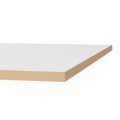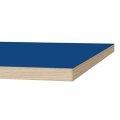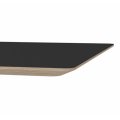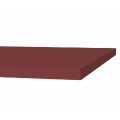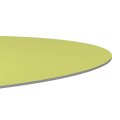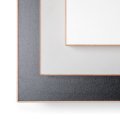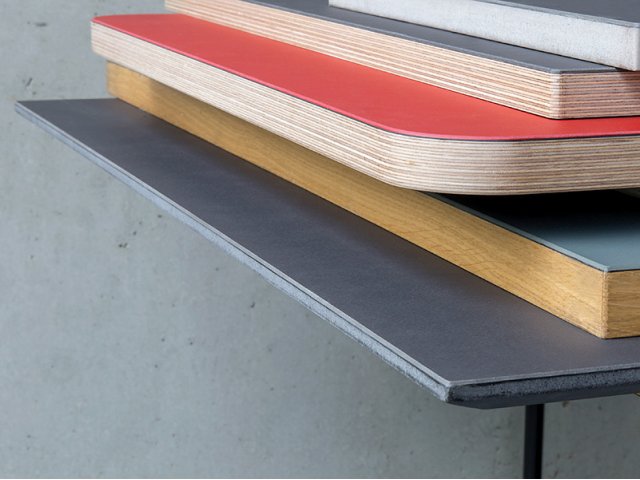Linoleum tabletop
The linoleum table top has more colors and shapes than any other in our range. High-quality table top materials combine with distinct paneled edging and rounded corners, as well as your choice between beautiful linoleum colors. It's possible to configure over 1000 linoleum table tops! There is a linoleum table top for every taste. Find yours.
Our colour samples will help you choose the colour of your table top.
Versatile linoleum
- Natural material made of linseed oil, jute, and powdered wood and limestone
- Colorful and varied
- Pleasant feel (matt and non-slip)
- Short-term heat resistance up to 70°C
- Anti-bacterial effect
- Biodegradable
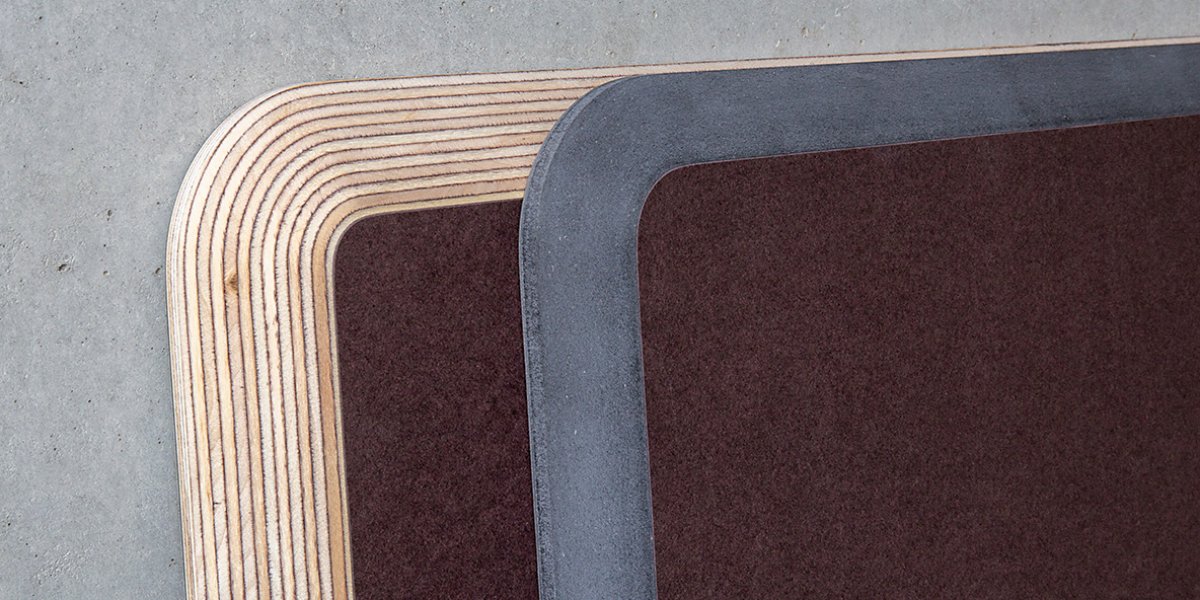
Where can the linoleum table top be used?
Whether colorful and rustic or monochrome and reserved, whether for the dining room, home office, office, or conference room, a linoleum table top is the perfect desktop. Linoleum has a pleasant feel. It is firm, yet elastic, so it's not surprising that writers and drafters appreciate the material as a working surface.
Due to its antibacterial effect, the linoleum table top is also suitable for the kitchen and dining area. The material is flame-resistant to normally inflammable (Class C-fl). A hot cup of coffee can be placed on the linoleum table top without a guilty conscience because it is heat-resistant for short amounts of time (up to 70°C). In technical environments such as server rooms or production areas, linoleum protects against static electricity.
The linoleum table top is not suitable for use in bathrooms, damp cellars, and other rooms with high humidity. The point load of linoleum is also problematic. The tip of a pencil or other pointed objects should not be pressed too firmly onto the linoleum surface, as there is a risk of damage to the surface. If you want to place plants and flower pots on your table top, we recommend matching coasters or mats. Terracotta, clay, and metal (rust) can discolor linoleum.
How to find the right linoleum table top?
The many combination possibilities can be quite confusing: 21 linoleum colors, three high-quality top materials, and also a variety of edge veneers, edges, and corners. How do you find the right desktop? Which table top material is suitable for what? We provide an overview to help you with the configuration of your linoleum table top.
1. With veneer edging
Material: Fir wood blockboard with real wood or plastic (ABS) edge band
Maximum size: 320 x 180 cm
Thickness incl. Linoleum: 30 mm
2. Birch plywood
Material: Birch plywood core with finely ground edge. Straight or bevelled edge (25°)
Maximum size: 300 x 150 cm
Thickness incl. Linoleum: 20 mm or 26 mm
3. Valchromat MDF
Material: Valchromat MDF core with finely ground edge. Straight or bevelled (25°) edge
Maximum size: 240 x 180 cm
Thickness incl. Linoleum: 21 mm
Discover 3 table top cores
1. Laminboard with veneer edging
Real wood edging: Walnut / Smoked oak / Larch / Multiplex Birch / Oak / Ash
ABS plastic edging: Black or in the same color as the linoleum surface

The core of our linoleum table top with veneer edging consists of a 28 mm thick fir wood laminboard top. It's made of sticks of fir wood that are about 5 mm wide and glued together. Such material processing makes the linoleum table top extremely dimensionally stable and suitable for large-format tables. The sides of the panel are covered with real wood or ABS plastic edge veneer. A total of 6 real wood edgings, an ABS edging in black, and an ABS edging in the color of the chosen linoleum are all available for selection.
For fans of monochrome desktops, we recommend combining linoleum and ABS edge veneer in the same color. For a small or large contrast between the color of the linoleum and the edge, we recommend choosing the desired linoleum and an untreated, natural real wood edge. The selection is huge, and a total of 252 linoleum table tops can be configured solely on the basis of linoleum and wood edge.
What is the laminboard table top with edge veneer suitable for?
Material: Laminboard made of fir wood with edge veneer made of real wood or ABS plastic
Maximum dimensions: 320 x 180 cm
Thickness incl. Linoleum: 30 mm
Suitable for
- all Modulor series table frames (E2, M, T, Y)
- desks, drawing tables, work tables, office tables, dining tables, kitchen tables, conference tables
- subtle or courageous linoleum-edging combinations
- large format tables (thanks to material processing and 30 mm top thickness)
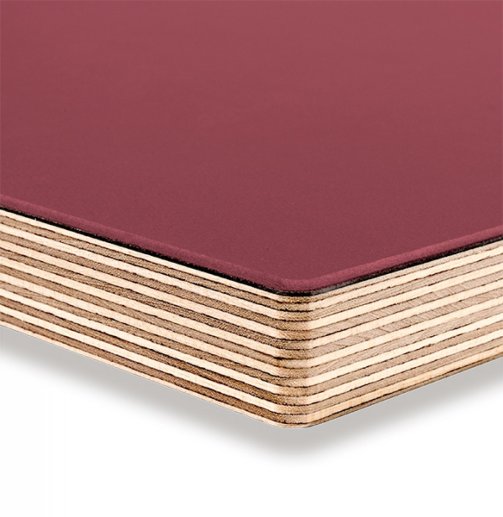
2. Multiplex Birch
The Multiplex Birch top consists of several layers of birch plywood. The striking, "striped" edge of the table top is created when the individual veneer layers are glued. They are pressed crosswise by 90° against each other so that the grain changes per layer. The linoleum table top draws its strength from these changes in direction. The change ensures that the plywood warps less.
The edge of the linoleum table top is untreated and finely sanded, so the striped pattern is unobstructed. Although the edge is not varnished, the Multiplex board is still moisture-repellant and highly resistant due to the waterproof gluing. If you are looking for a linoleum table top that is particularly delicate in appearance, you can choose a 25° beveled edge instead of a straight edge. Less material makes the linoleum table top appear lighter and, above all, almost floating on the table frames of our Y series.
What is the Multiplex Birch table top suitable for?
Material: Ground Multiplex Birch with a straight or beveled edge (25° bevel)
Maximum dimensions: 300 x 150 cm
Thickness incl. Linoleum: 20 mm or 26 mm
Suitable for
- all Modulor series table frames (E2, M, T, Y)
- table frames with supporting substructure or top reinforcements when choosing 20 mm top thickness
- desks, drawing tables, work tables, office tables, dining tables, kitchen tables, conference tables
- a natural, light and delicate appearance (beveled edge)
- large format tables (26 mm thick) and smaller tables (20 mm thick)
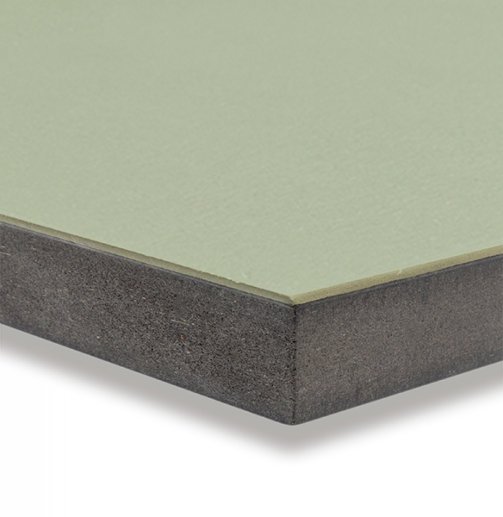
3. Valchromat MDF
Valchromat is a water-repellent, dyed, and highly compressed wood fibreboard (MDF). In the production process, individual wood fibres are dyed with organic colors. Together with a special glue and the force of a press, the result is a dense, very flexible, homogeneous fibreboard. The edges of the MDF are untreated and open porous. Despite its raw and immediate nature, the finely ground material is moisture-repellent and has a high mechanical resistance.
With MDF in gray and anthracite, discreet, unobtrusive table tops can be configured. The two shades of gray are a good basis for similar linoleum shades and thus form linoleum table tops with an almost monochrome effect. When MDF is combined with a strong linoleum color, the material creates a pleasant balance for the eye. A 25° beveled edge helps give the linoleum table top an unobtrusive, lightweight appearance.
What is the Multiplex Birch table top suitable for?
Material: Ground Valchromat MDF with a straight or beveled edge (25° bevel)
Maximum dimensions: 240 x 180 cm
Thickness incl. Linoleum: 21 mm
Suitable for
- all Modulor series table frames (E2, M, T, Y) with supporting substructure or top reinforcements, so that the table top does not deform or sag
- desks, drawing tables, work tables, office tables, dining tables, kitchen tables, conference tables
- a natural, light and delicate appearance (beveled edge)
- small to medium-sized tables
Colours and shapes of the Linoleum Table Top
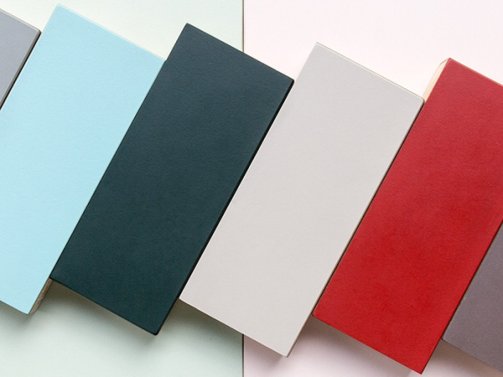
Linoleum table top in 21 colors
The combination of renewable raw materials - linseed oil, jute, and powdered wood and limestone - makes linoleum a homogeneous, matt, and non-slip material. With its pleasantly warm feel, the linoleum table top is the perfect basis for desks and work tables. A total of 21 colors ensure a modern and varied interior design.
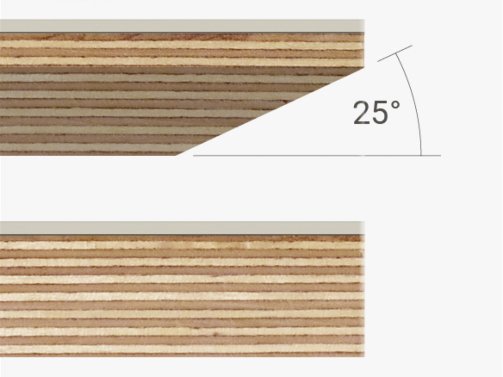
Two types of edges
What makes our linoleum table top special? Besides the variety of linoleum colors and the high-quality materials, it's the shape of the table top edge. A distinctive beveled edge complements our selection of classic straight edges. The bevel of 25° on the underside makes the robust table top appear thinner, more delicate, and almost floating. The beveled edge is available with the Multiplex Birch and Valchromat MDF core materials.
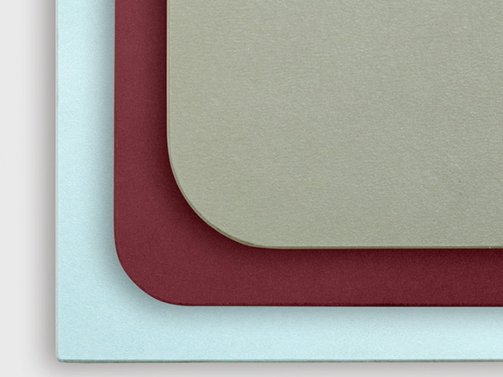
Three corner choices
Not only with edges, but also with corners. The smallest corner radius of 3 mm corresponds to a classic table top corner. The two more rounded corners (25 mm or 50 mm corner radius) ensures that the linoleum table top has a less solid, soft, and contemporary appearance. In this way, they support the reduced shape of the bevel edge. The 25 mm and 50 mm corner radius are only available for the Multiplex Birch and Valchromat MDF core materials.
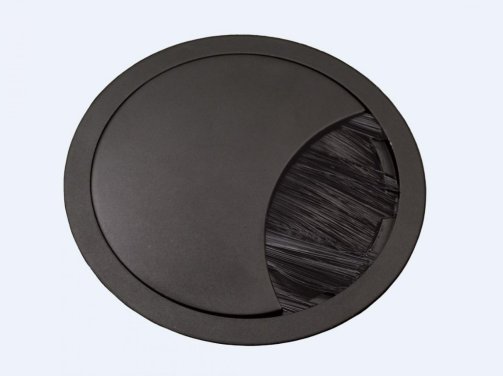
Three cable openings
Goodbye, cable clutter! Granted: A cable opening in a linoleum table top certainly does not solve the problem of the amount of cables. But it bundles all equipment, charging, and lamp cables together and ensures a tidy overall view. If you like, you can use the hole in the linoleum table top for a different purpose. You can use it as a cup holder or drop paper snippets conveniently into the paper recycle bin placed underneath.
Most 80 mm diameter holes are milled without edging. It exposes the different layers of the linoleum table top. For those who prefer less raw material, choose a cable passage with aluminium surround (Ø 74 mm) or a cable passage with lockable cover and plastic bristles (Ø 74 mm). The latter ensures that cables do not slip or slip through, even when devices are removed.
Characteristics of the linoleum table top
Maximum dimensions
Linoleum tabletop with edge band
320 cm x 180 cm
Linoleum tabletop with polished Multiplex Birch edge
300 cm x 150 cm
Linoleum tabletop with polished MDF edge
240 cm x 180 cm
Cable passage
Distance between the edge of the table top and the centre of the cable passage
Min. 9 cm
Thickness
Linoleum tabletop with edge band
30 mm
Linoleum tabletop with polished Multiplex Birch edge
20 mm or 26 mm
Linoleum tabletop with polished MDF edge
21 mm
Corner radius
Tabletop with edge band
3 mm
Linoleum tabletop with polished edge
3 mm, 25 mm or 50 mm
Making a desktop: Industrial production + handicraft = linoleum table top
The production process of linoleum table tops combines the advantages and reliability of industrial production with the quality-conscious approach and skills of the craftsman. Unlike our melamine table tops, the core of a linoleum table top can consist of three different materials: A laminboard made of fir wood, a Multiplex board made of birch wood, or a Valchromat MDF board.
The linoleum is cut to size by hand. Since linoleum is a natural material wound on rolls, it is examined very carefully for inclusions and defects before being pressed. Only flawless linoleum pieces are further processed and pressed with the carrier plate. In order for the linoleum table top to remain dimensionally stable, a backing on the underside of the top is always required during lamination. At the turn of the linoleum table top is a brown-violet paper with a similar response to that of linoleum. It ensures that the plate does not warp. The icing on the cake is the regrinding of the linoleum edge with a hand tool. This creates a skillful and beautiful finish.
Depending on the core material, the processes involved in the production of a linoleum table top vary slightly. The Multiplex Birch board and the Valchromat MDF board are only roughly cut before the linoleum is applied. The CNC milling machine provides each linoleum table top with the desired edge formation and the preferred corner radius. Post-processing and repairs are carried out manually.
In the production of the laminboard with edge veneer, the top material is first cut precisely. The edge is approached, and then the linoleum is applied, and the edge is finished by hand. Because the linoleum is glued to the edge and remains visible from the side, it is also referred to as a single edge veneer.
Cleaning the linoleum table top: How to care for your desktop properly
The type and frequency of care and cleaning of a linoleum table top depend on the use of the table top and the degree of dirt. As a rule, it is recommended that spilled drinks, sauces, ice, or the like are immediately absorbed with a soft cloth so that they do not have time to penetrate the material. Regardless of stains and dirt, we recommend that the linoleum table top is carefully maintained. The material is quickly over-treated, and oily products, in particular, can clog it up and leave shiny spots. From our experience with linoleum table tops, we know that oily care products and incorrect use can reduce the elasticity of the material. Therefore, we recommend, for example, to apply corresponding products to the material with a cloth and to smear them quickly.
If the table top is dusty, or if there are crumbs or other loose dirt particles lying on it, this can be easily removed with an ordinary dust cloth.
In cases where dirt has already settled on the linoleum surface, we recommend a cleaning agent especially for linoleum table tops (e.g., Harell linoleum cleaner). Since linoleum is sensitive to lye, a cleaning agent without aggressive lyes should be chosen. With a lint-free cloth and the cleaning agent dissolved in a little water, the dirt can be wiped off the linoleum table top. In case of stubborn dirt, the cleaning agent should be used undiluted and the cleaned surface wiped with a cloth soaked in water.
We do not recommend disinfectants that are not specifically suitable for linoleum. They can discolor the material and leave non-detachable stains. Solvent-containing products, such as the alleged emergency nail polish remover, attack the surface of the linoleum tabletop and also leave irreversible marks.
Never fear the yellow tint
Linoleum is a natural material. Particularly with linoleum table tops in bright colors, post-oxidation can become noticeable and form a so-called drying chamber film. It manifests itself in a soft yellow tint that is harmless and disappears under UV light. When the linoleum table top is used as a desk or work table, the drying chamber film forms where computers, printers, or the like are located. As soon as the equipment and office utensils are removed, and the surface gets access to the sunlight, the original color of the linoleum also returns. The yellow tint cannot be removed by cleaning.
Noble and durable linoleum table tops.
It's that easy to choose your new tabletop:
Click on the product with the preferred tabletop edge (classic straight or 25° bevelled) and the desired corner radius (3 mm, 25 mm or 50 mm).
On the side of your desired product you have the choice between 3 panel cores (MDF Valchromat, Multiplex and if necessary real wood or ABS edging), 21 linoleum colours and 4 panel thicknesses (20 mm, 21 mm, 26 mm and if necessary 30 mm).
